Меню
Меню is a word that both Russian and English have borrowed from French, and it of course means menu. Because it ends in a sound that is not typical for a nominative singular noun in Russian, the noun is indeclinable, which means that it never changes endings. That's right: the genitive singular of меню is меню, as is the instrumental plural and all the other forms. However, the adjective that modifies the noun will definitely change for case. Since меню is both indeclinable and inanimate, it is treated as a neuter noun in Russian. Thus the phrase 'this menu' declines like this:
| Sg | Pl | |
| Nom | это меню | эти меню |
| Acc | ||
| Gen | этого меню | этих меню |
| Pre | этом меню | |
| Dat | этому меню | этим меню |
| Ins | этим меню | этими меню |
Here are a few sample sentences:
| Передайте, пожалуйста, меню. | Pass me the menu, please. |
| Вам нужно меню? | Do you need a menu? |
| Я закажу без меню. Я уже знаю, что я хочу. | I'll order without the menu. I already know what I want. |
| Не поверишь, какое меню в ресторане «Нептун». Там морепродуктов без конца! | You won't believe the menu at the Neptune Restaurant. There's no end to the seafood offerings! |
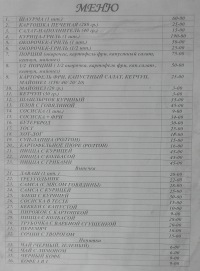 When you first get to Russia and look at a Russian menu, your brain will likely undergo a complete meltdown. They phrase things differently. They list the weights of the components for many dishes. They have different customary dishes. And things are simply organized differently. So here for your viewing pleasure, I shall provide you with a Russian menu. It's a little trickier than Moscow menus because it contains borrowed Tatar words like элеш and перемяч which even Russians don't necessarily know outside of Tatarstan. It's the menu of a little kiosk that is located not far from the building that houses the филфак of the Tatar State Humanities Pedagogical University. There was a week where I had coffee there every morning. A preview of their menu is at the right. Click on the menu to see a larger version. An English translation of the menu is below.
When you first get to Russia and look at a Russian menu, your brain will likely undergo a complete meltdown. They phrase things differently. They list the weights of the components for many dishes. They have different customary dishes. And things are simply organized differently. So here for your viewing pleasure, I shall provide you with a Russian menu. It's a little trickier than Moscow menus because it contains borrowed Tatar words like элеш and перемяч which even Russians don't necessarily know outside of Tatarstan. It's the menu of a little kiosk that is located not far from the building that houses the филфак of the Tatar State Humanities Pedagogical University. There was a week where I had coffee there every morning. A preview of their menu is at the right. Click on the menu to see a larger version. An English translation of the menu is below.
Menu
| Rubles | Dollars | ||
| 1. | Shawarma (1) | 60 | 2 |
| 2. | Baked potato (280 g.) | 25 | 0.83 |
| 3. | Side salad (40 g.) | 15 | 0.50 |
| 4. | Grilled chicken (1) | 190 | 6.33 |
| 5. | Thigh-drumstick (1) | 50 | 1.66 |
| 6. | Thigh-drumstick (½) | 25 | 0.83 |
| 7. | Plate (1 thigh-drumstick, fries, cabbage salad, ketchup mayonnaise) | 75 | 2.50 |
| 8. | ½ plate (½ thigh-drumstick, fries, cabbage salad, ketchup mayonnaise) | 50 | 1.66 |
| 9. | Fries, cabbage salad, ketchup, mayonnaise (150g, 40g, 20g, 20g) | 25 | 0.83 |
| 10. | Mayonnaise (20g) | 3 | 0.09 |
| 11. | Ketchup (30g) | 3 | 0.09 |
| 12. | Chicken shishkebab | 35 | 1.17 |
| 13. | Rice pilaf with beef | 45 | 1.50 |
| 14. | Sausage link (1) | 9 | 0.30 |
| 15. | Sausage link + fries | 34 | 1.13 |
| 16. | Sandwich | 30 | 1.00 |
| 17. | Toast | 25 | 0.83 |
| 18. | Hot-dog | 18 | 0.54 |
| 19. | Rolton noodle soup — instant | 15 | 0.50 |
| 20. | Rolton mashed potatoes — instant | 16 | 0.53 |
| 21. | Chicken pizza | 45 | 1.50 |
| 22. | Sausage pizza | 45 | 1.50 |
| 23. | Mushroom pizza | 45 | 1.50 |
| Baked goods | |||
| 21. | Lavash (1) | 20 | 0.67 |
| 22. | Stuffed triangle | 22 | 0.73 |
| 23. | Beef croissant | 28 | 0.93 |
| 24. | Chicken croissant | 25 | 0.83 |
| 25. | Large savory hole-less doughnut stuffed with chicken | 30 | 1.00 |
| 26. | Pig in a blanket | 15 | 0.50 |
| 27. | Cabbage with bacon | 10 | 0.33 |
| 28. | Potato calzone | 9 | 0.09 |
| 29. | Sausage pizza | 28 | 0.93 |
| 30. | Waffle cone with fried sweetened, condensed milk | 20 | 0.67 |
| 31. | Small savory doughnut | 16 | 0.53 |
| 32. | Sweetened farmer’s cheese pastry | 15 | 0.50 |
| Drinks | |||
| 33. | Tea (black, green) | 6 | 0.18 |
| 34. | Tea with lemon | 6 | 0.18 |
| 35. | Black coffee (coffee, sugar) | 9 | 0.27 |
| 36. | 3-in-1 coffee (coffee, cream, sugar) | 9 | 0.27 |
If you read carefully, you'll notice the same item is listed twice at different prices (#22 & #29). I still haven't figured that issue out. And considering the numbering problem on the menu, I'm guessing that they haven't figured it out either.
Корточки
One thing that surprises Americans in Russia is how often you can see people squatting. In the States I think most people lose this ability somewhere by the time they are thirty; constantly sitting in chairs allows the hamstrings and calf muscles to get tighter and tighter, which means those muscles lack the elasticity to maintain the position. (Regular attendance at yoga classes can help you bring that elasticity back.) The prepositional phrases in Russian used to describe this position include the word корточки. It only occurs in the plural, and theoretically in all six cases, though truth to tell I have never seen it in the instrumental, dative, or nominative:
| Pl | |
| Nom | корточки |
| Acc | |
| Gen | корточек |
| Pre | корточках |
| Dat | корточкам |
| Ins | корточками |
If a person is in a squatting position, one mostly uses the verb сидеть/посидеть 'to be sitting' to capture the image. This verb is a location verb, thus you use with with the prepositional case and the preposition на.
| На этой фотографии вы увидите, как мужчина сидит на корточках. | In this photograph you will see a man squatting. |
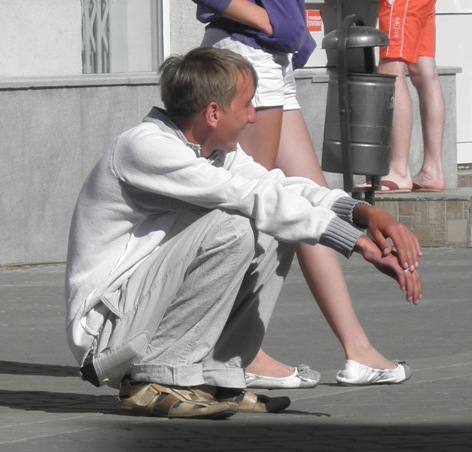
When anthropologists discuss this position, they often use the word 'hunkering.' In the fully developed position the buttocks rest on the back of the shins or ankles. Young Russian men often hunker together in summer evenings smoking cigarettes and drinking beer. You aren't really supposed to drink beer on public streets in Russia, but as long as you aren't causing trouble, the police generally turn a blind eye:
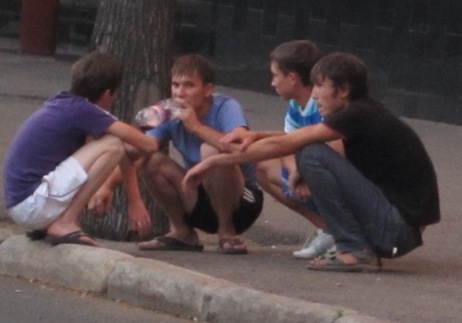
To describe getting into that position, you most commonly use the verb садиться/сесть 'to sit down,' although you can also use присаживаться/присесть or опускаться/опуститься. These are motion verbs, so you use them with на plus the accusative:
| Дима сел на корточки и позвонил своей девушке. | Dmitri squatted down and called his girlfriend. |
| Один из симптомов повреждения менисков коленного сустава — это невозможность присесть на корточки. (adapted from this source) | One of the symptoms of damaged menisci of the knee joints is the inability to squat. |
| Мне так не хотелось приближаться, но я вдохнула неглубоко через рот и опустилась на корточки рядом с ним. (adapted from this source) | I really didn't want to get closer, but I inhaled a bit through my mouth and squatted down next to him. |

Мороженое
The generic word for ice cream in Russian is мороженое. In form it is declined like a neuter adjective, although they use it as a noun. Theoretically the plural forms exist, though I have not personally encountered them yet:
| Sg | Pl | |
| Nom | мороженое | мороженые |
| Acc | ||
| Gen | мороженого | мороженых |
| Pre | мороженом | |
| Dat | мороженому | мороженым |
| Ins | мороженым | морожеными |
We Americans have all heard stories of those crazy Russians buying ice cream in the dead of winter. During my first trip to Moscow in 1986, I asked my acquaintance Алёша about that:
| — Правда ли, что русские стоят в очереди за мороженым даже зимой, когда на улице минус десять градусов? | "Is it true that Russians will stand in line for ice cream even in the winter when it's ten below outside?" |
| — Правда. | "It's true." |
| — Но почему же? Ведь так холодно! | "Why in the world? I mean it's so cold!" |
| — Потому что вкусно. | "Because it tastes good." |
Oh. Well, ask a stupid question...
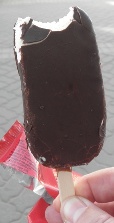
|
During the Soviet period you could mostly buy vanilla ice cream, although ice cream with a chocolate coating (эскимо) was commonly available as well. Occasionally you would see chocolate or strawberry. Nowadays they have all sorts of flavors and toppings. I had a crème brûlée (крем-брюле) ice cream the other day that was wonderful. Here are a few sample sentences: |
| — Хочешь мороженое? — Хочу. |
"Do you want ice cream?" "I do." |
| На десерт мы заказали блинчики с мороженым. | For dessert we ordered crepes with ice cream. |
| Без мороженого я не могу жить. Я его ем каждый день. | I can't live without ice cream. I eat it every day. |
| Мама всегда добавляет орешки в домашнее мороженое. | Mom always adds nuts to her homemade ice cream. |
Although мороженое is a generic word for ice cream, there is another word you have to know nowadays to be ice-cream-competent in Russia. I'll blog about it in a week or so. Your assignment: take your best guess what that word is and post it in the comment section.
Чай (часть вторая)
The Russian word for tea is чай. Russians drink a lot of hot tea, even when it's hot out. They seem to have this theory that if you drink hot tea, then you sweat, and sweat cools you down, so drinking hot tea cools you down. Don't try to argue with the logic of that. They won't buy it.
In the States if you ask someone under 30 how to make tea, they will probably tell you something like: "Put the teabag (чайный пакетик) in the cup (чашка). Pour in boiling water (кипяток). When the water changes color, pull the teabag out." If they are tea experts, they might add, "Pull out the teabag as soon as the water changes color or the tea will turn out bitter." A Russian would just laugh at that. Yes, Russians have teabags, but making tea with them is a sign of incompetence. That's right: tea-bagging = incompetence.
So how do Russians make tea? Obviously you have to start with a чайник teapot:
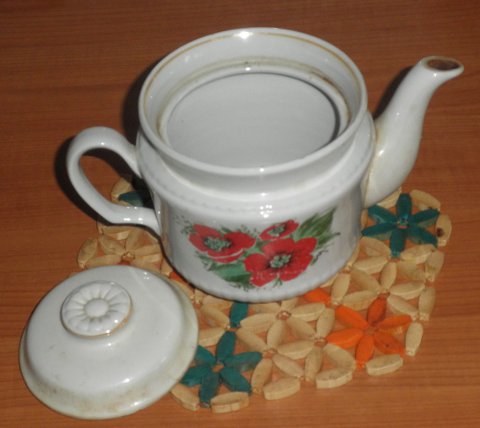
You may notice that the teapot is not the same thing as an American tea kettle. The teapot is smaller. If you rotate it, then you see that it has a built-in strainer:
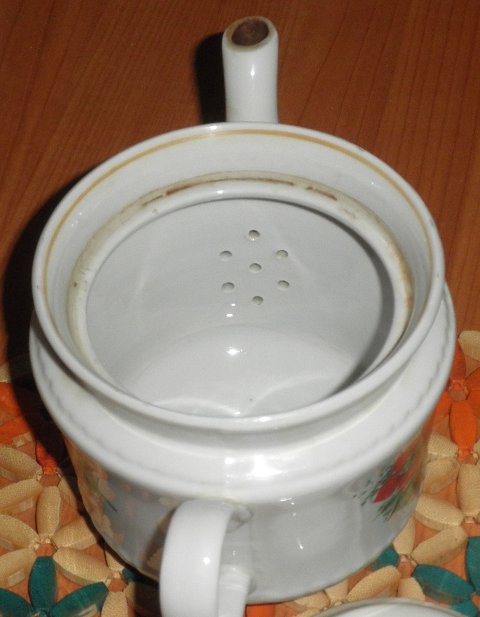
Here's how it works. You put a ton of tea in the teapot, then you add hot water. This makes a заварка, which is an intense tea brew. You then fill your cup perhaps one fourth full of the заварка:
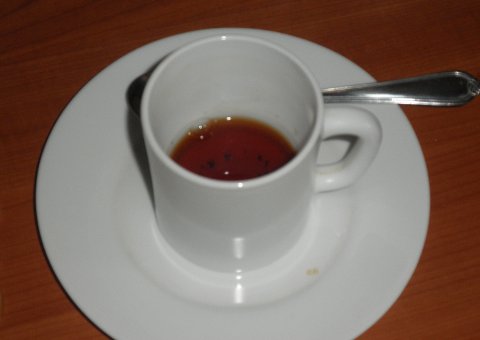
Then you take hot water out of a tea kettle which has brought the water to a temperature so hot that even the animals around Chernobyl would be intimidated:
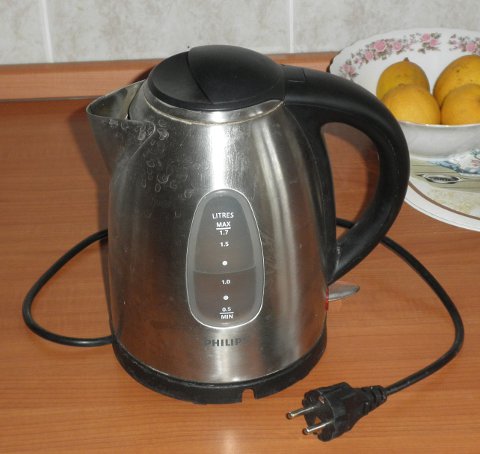
You then fill the the cup with the Chernobyl water:
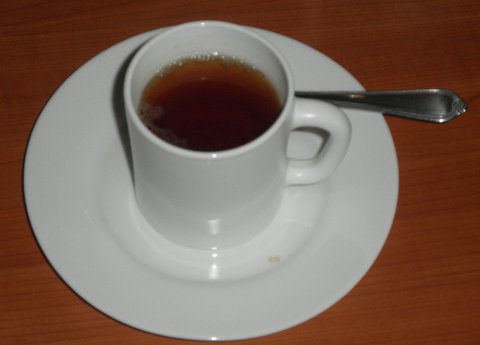
You then let it cool down a bit, say for 1.5 days (полтора дня). Then you drink the tea. And that's the proper way to make tea.
Okay, I was kidding about the 1.5 days part. But they really do heat the water up über-hot, and you really do have to let it cool a while.![]()
Слева
One of the words you use in Russian to describe where something is located is the adverb слева, which can be translated "on the left" or "on the left-hand side." When you get experience your first Russian-language tours in Russia, your tour guide will certainly use the word in phrases like this:
| Слева находится Китайский цирк. | On the left-hand side is the Chinese Circus. |
| Слева вы увидите изввестный Татарский театр. | On the left you will see the well-known Tatar Theater. |
To express the concept "to the left of," you add the preposition от followed by the genitive case:
| Слева от банка находится ювелирный магазин. | To the left of the bank there is a jewelry store. or A jewelry store is located to the left of the bank. |
| Слева от Юры сидит Наташа. Она владеет тремя языками. | Sitting to the left of Yuri is Natalya. She has mastered three languages. |
Although слева can be used to indicate location, the word can also mean "coming from the left" or "from the left" or "from the left side":
| Слева ко мне подкрался карманник. | A pickpocket snuck up to me on the left-hand side. |
| Всегда подходи к лошадям слева, а то они тебя лягнут. | Always approach horses from the left, otherwise they'll kick you. |
<< 1 ... 55 56 57 ...58 ...59 60 61 ...62 ...63 64 65 ... 158 >>